On September 1, the New Economic School will get a new rector. We talked with the resigning head of NES Ruben Enikolopov about his own evaluation of his work, whether he will remain a professor of the School, and, most importantly, what changes may NES go through.
New Rector – New Strategy
Let's start with the main news - the new rector. His name has already been announced, but once again we ask you to introduce him. Like at an Oscars ceremony, you have the envelope with a name...
And it says: Anton Suvorov. I am very glad that he has agreed to become the next NES rector. Anton is a graduate of the School, so he understands perfectly what the “NES DNA” is, what is so special about the New Economic School. I think this is very important, especially in the current difficult situation. It will allow us to preserve the NES identity.
Anton is the optimal choice for the rector's position. On the one hand, he has administrative experience from the Higher School of Economics. And in addition, he is a very good economist, an expert in game theory, behavioral economics, so he understands perfectly the academic side of the work. This is a rare combination; such people can be counted on the fingers of one hand. We are very glad that Anton has agreed to become the new rector and take on this difficult job.
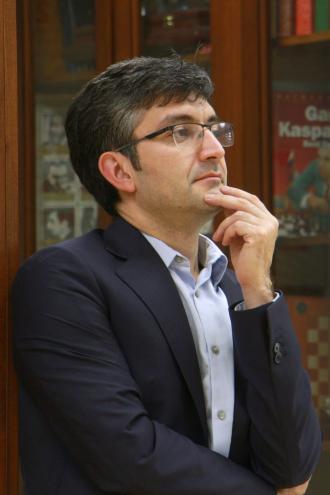
September, 2018
You will now be handing over the position, and budget is an important topic. What is your assessment of the School's financial state?
We are financially stable, but I would not say that we roll in money, we are not in a situation where there is so much money that we do not know what to do with it. Unfortunately, we do not have such a problem. It is clear that the situation in the Russian economy is quite difficult, but despite this, almost all of our donors have confirmed their funding. In a sense, everything is even better than we could have expected a few months ago. But we should bear in mind the high level of uncertainty, it is difficult to make long-term plans. In any case, today we have no reason to expect serious financial problems that could significantly affect the School's work.
At the Board of Directors, you probably discussed not only the candidate for the rectorship, but also the School's future path. A few years ago, the 2025 Strategy was adopted, is it still in place? Will the NES development path be adjusted somehow?
This was not on the agenda of the Board of Directors. Most of the goals that were outlined in the Strategy remain relevant. We already have a new campus, our community development is always on the agenda, and financial diversification is becoming even more relevant than before. Perhaps it is worth developing more actively business education programs that earn money for the School. Meanwhile, the Board of Directors made the right decision to postpone review of the Strategy until the autumn. There will be a dedicated discussion of where we are moving, strategic consideration of the new path.
There are two reasons why we are not doing this today. First: we want to see the results of the admission campaign. It is important for us to understand how applicants react, and how the situation has changed. Potentially, it could have changed a lot, or it could not have changed, it could have even improved, because the competitors may fall behind us in certain things. Our students are key for us, and we need to know what has changed in terms of their preferences, their demands. And the second reason is that the new strategy should come along with the new rector. This requires his full dive into the position. When the first shock passed after the late February events, we realized that we could wait and make a calm and informed decision about the further development of the School when we have enough information and when there would already be a new rector.
The strategy update is necessary, but I don't think it will be significant. Appetites will apparently need to be tempered, but in fact we will probably have a more conservative scenario of the same strategy. We had very ambitious goals which will now be more reserved due to circumstances. Still, the main vector of our work and development remains the same.
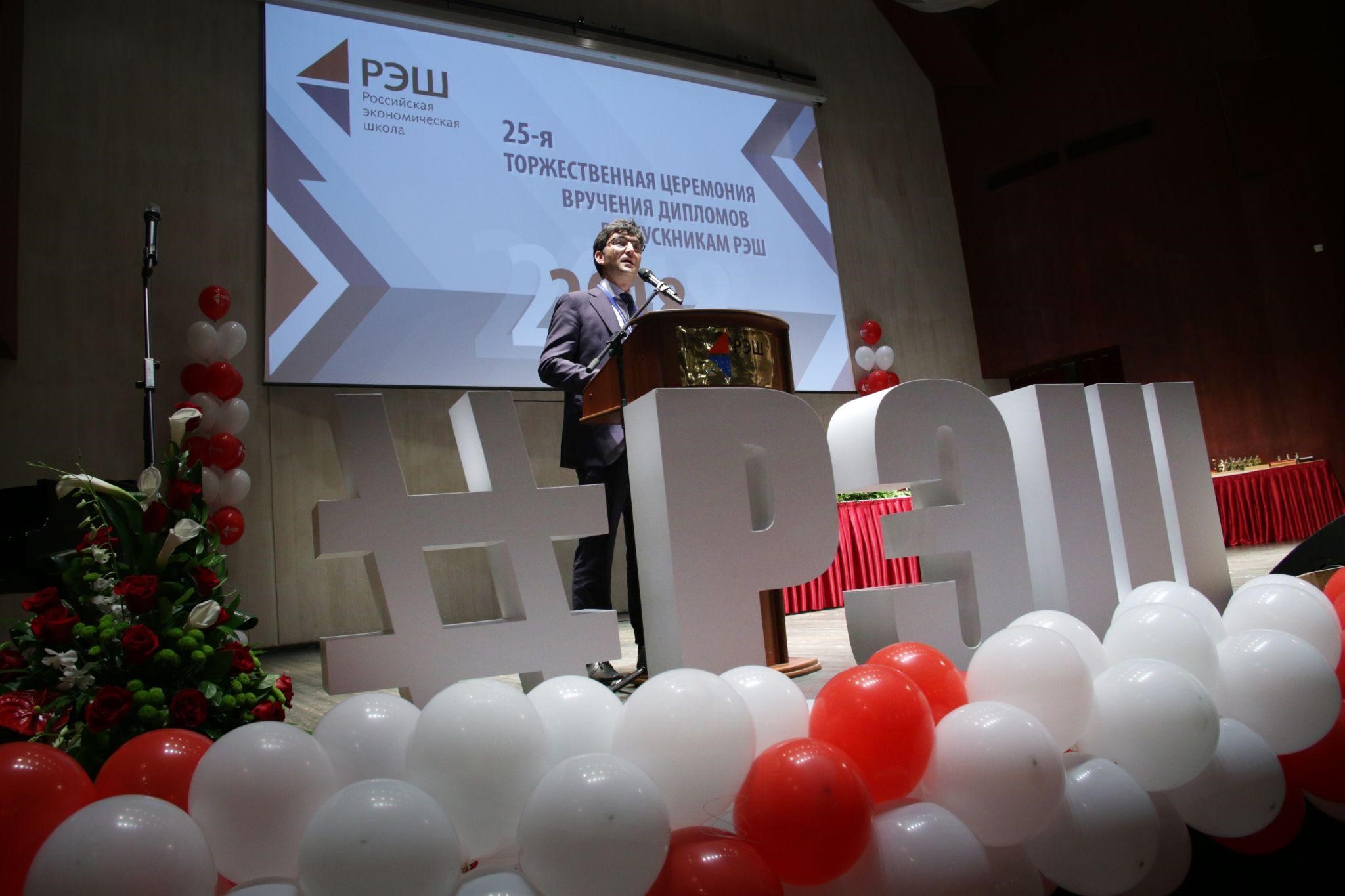
Commencement Ceremony, 2018
Will you remain on the NES Board of Directors?
Yes, if I don't get kicked out. (Laughs).
And what about your professorship at NES?
This is a difficult question. I will most likely become a visiting professor, because I have a permanent position at Pompeu Fabra University in Barcelona which imposes restrictions on my activities. And I have a tenure not from the university, but from the Catalan government, so there are much stricter requirements: they prohibit any affiliation outside of Catalonia. It is not even specific to NES, I just couldn't take an affiliation with the London School of Economics, Stockholm School of Economics, etc. If another institution is created in Catalonia, I can work there, but not outside it.
How do you see your future role in the life of the School and in the NES community?
I will definitely remain a member of the community, as I always was. Since I have a very good relationship with Anton, the plan is that I will be his adviser, formally or informally - this is not so important. I am open for contacts and ready to be part of the School’s life. The only thing I don't want is to take on any administrative responsibilities.
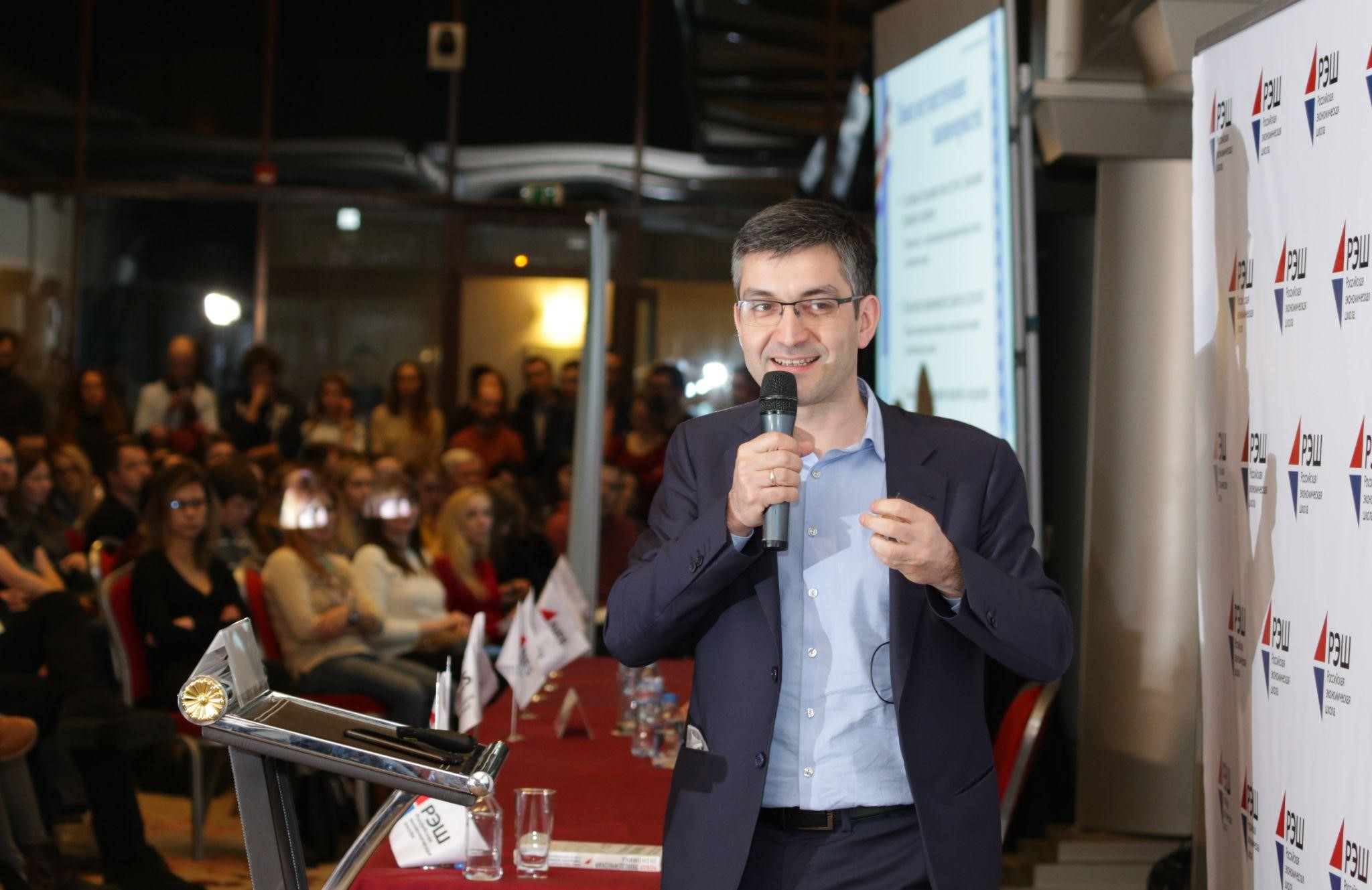
NES Lectorium, 2019
NES Educational Traditions and the Endowment
Let’s talk about educational programs. There is an ongoing discussion in the media about the rejection of the Bologna Process, the need to move towards national educational traditions, specialist’s degree, and so on. Did NES receive any official documents from the regulator on this matter?
No, we have not received any documents. Moreover, my understanding of the current situation is the following. The Bologna Process imposes certain restrictions on universities that they must follow. The rejection of the Bologna declaration means that they are no longer obliged to do so. Therefore, as a university you would have the option of following the framework or not. NES will stick to the principles of the Bologna system. In general, in my opinion, there is a wrong interpretation of the current discussion. I think that what the authorities talk about would allow more possibilities for universities: nobody will be forced to give up bachelor’s degree, master’s degree and so on. If previously we felt pressure that everyone should fit into the Bologna Process, now they are saying: “If you don't want to, you don't have to. You can offer a specialist's degree.” NES is not going to change anything in this regard, and there is no pressure that we feel.
You mentioned that NES is going through the current situation even better than expected. Did the endowment play a role in this?
Sure. The endowment has two goals: the first one is long-term strategic development, and the second is leveling out short-term fluctuations in liquidity. What we have earned in recent years has helped us to moderate the financial challenges that arose at some point, and we were able to get through them quite painlessly without taking anything from the principle of the endowment. And it does continue to support our strategic development.
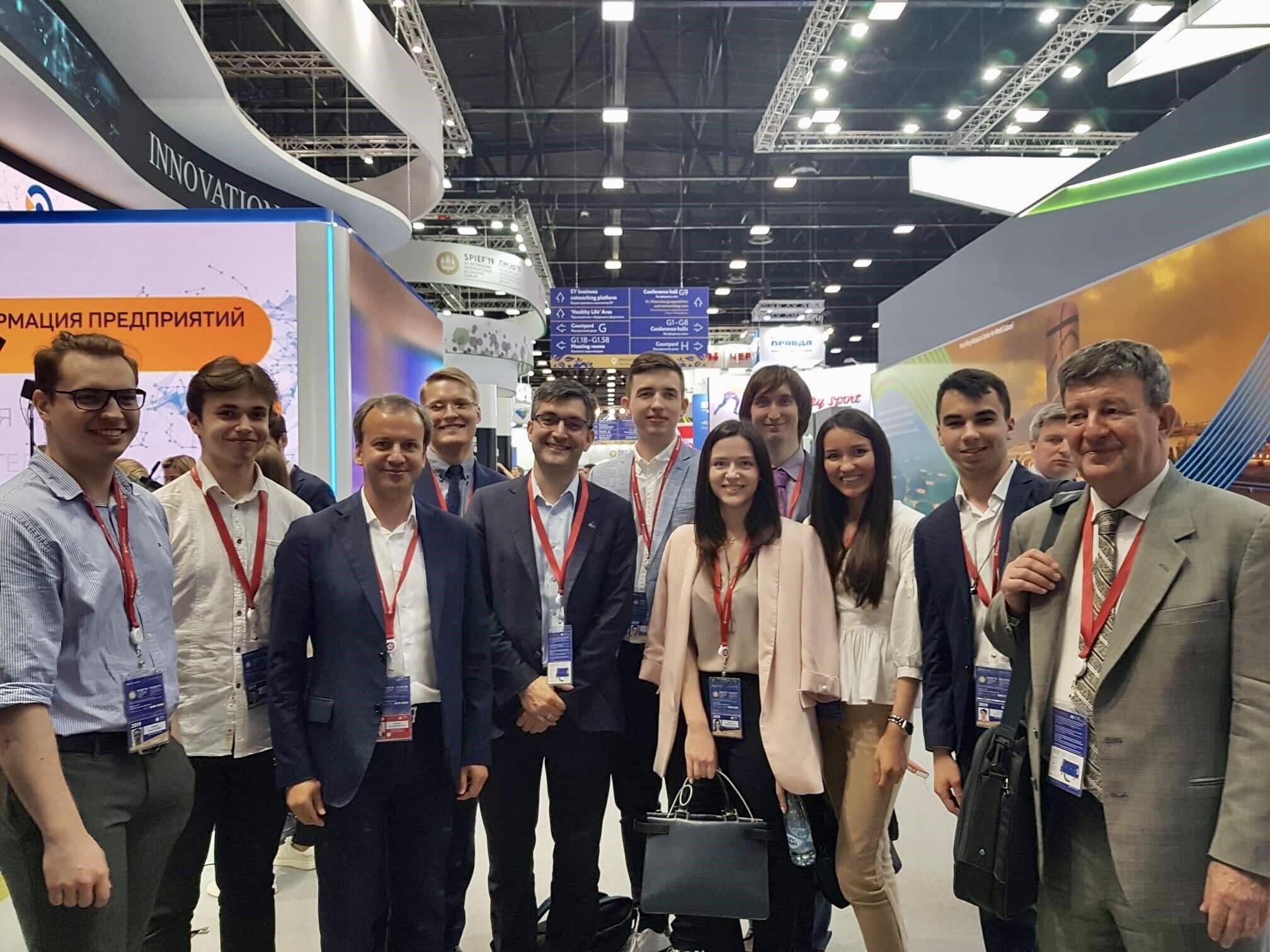
St. Petersburg International Economic Forum, 2019
Who makes the major contributions to the NES endowment? Is it large institutional donors or private ones? What were the smallest and the largest private donations this academic year?
Judging by the value of the donation, then, of course, it is large donors. The main role belongs to very large investments of a small number of donors. However, any support from all other partners is still very important for us. First of all, small contributions from a lot of people make up significant amounts. And secondly, they give a signal to the whole community and help attract large donations. When we talk with large donors, we say: look at how many people support the endowment, including our graduates and friends of the School. This becomes a powerful argument to persuade large donors to make donations. Indirectly, but small contributions to our endowment still affect the overall picture. We are talking about both recurring and one-time donations. The number of people who show support for the endowment is a vote of confidence in the endowment itself, an expression of trust on the part of the community in this institution.
As for the range of amounts that we received in donations to the NES endowment in this academic year (2021-2022), the smallest was 1000 rubles, it was a recurrent payment. And the largest donation from an individual was 5 million rubles.
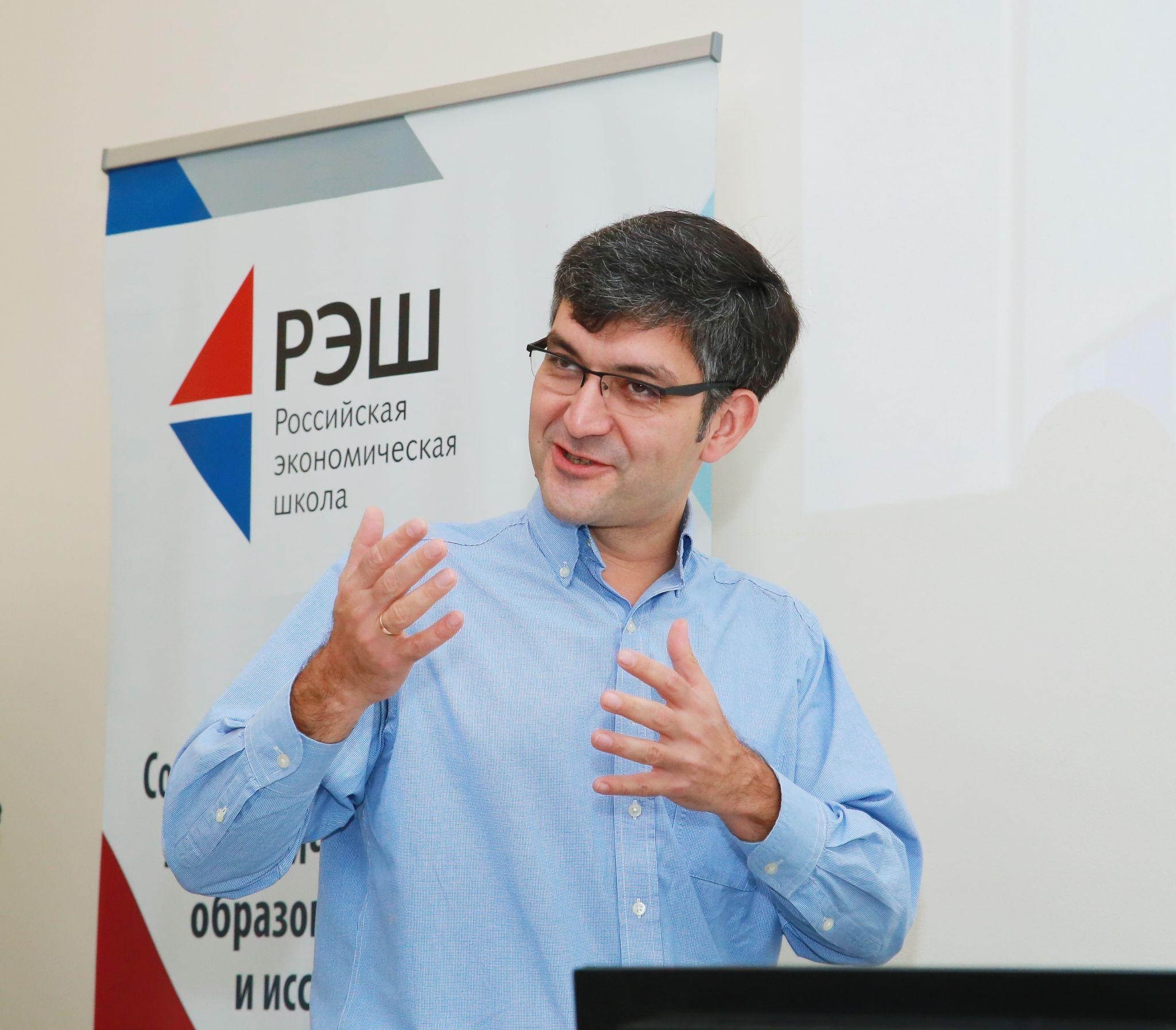
Orientation session for first-year students of Master's programs, 2019
In your opinion, what can help attract new donors now?
They are the same things as before. It seems to me that professional skills in economics and finance see an increasing demand nowadays. In a situation of uncertainty and big changes, understanding some fundamental things becomes much more important. Therefore, there is a growing demand for people that get their education and training at NES, our graduates and those who are part of the NES community. These are strong professionals, their role in the economy, and therefore the importance of NES will only increase. I am very spoiled by physics, so I can give an example from physics: at school we are taught that the acceleration of gravity is g = 9.8 m / s2. People whose understanding of physics remains at the school level will be shocked to learn that the law of gravity does not work on the Moon, it is different there. And if you know a more fundamental law, then you will understand the gravity on Earth, on the Moon, etc. The same relates to economics. There are wonderful applied programs, but they train to work only within certain scope and limits. And this knowledge may suddenly become useless, because the world has changed, and it turned out that the learned framework and concepts are no longer relevant. People who understand the basic laws of economics and finance can adapt much better to the changing environment. The other day I read a newsletter from the McKinsey Global Institute. Its headline was something like this: over the past 20 years, everything has changed except the fundamental laws of finance. It is these fundamental laws that we teach students at NES. Yes, there are people in economics and finance who are well aware of relatively simple things, but they are becoming less in demand. Meanwhile, people who are capable of creativity based on basic, fundamental laws, are now coming to the fore.
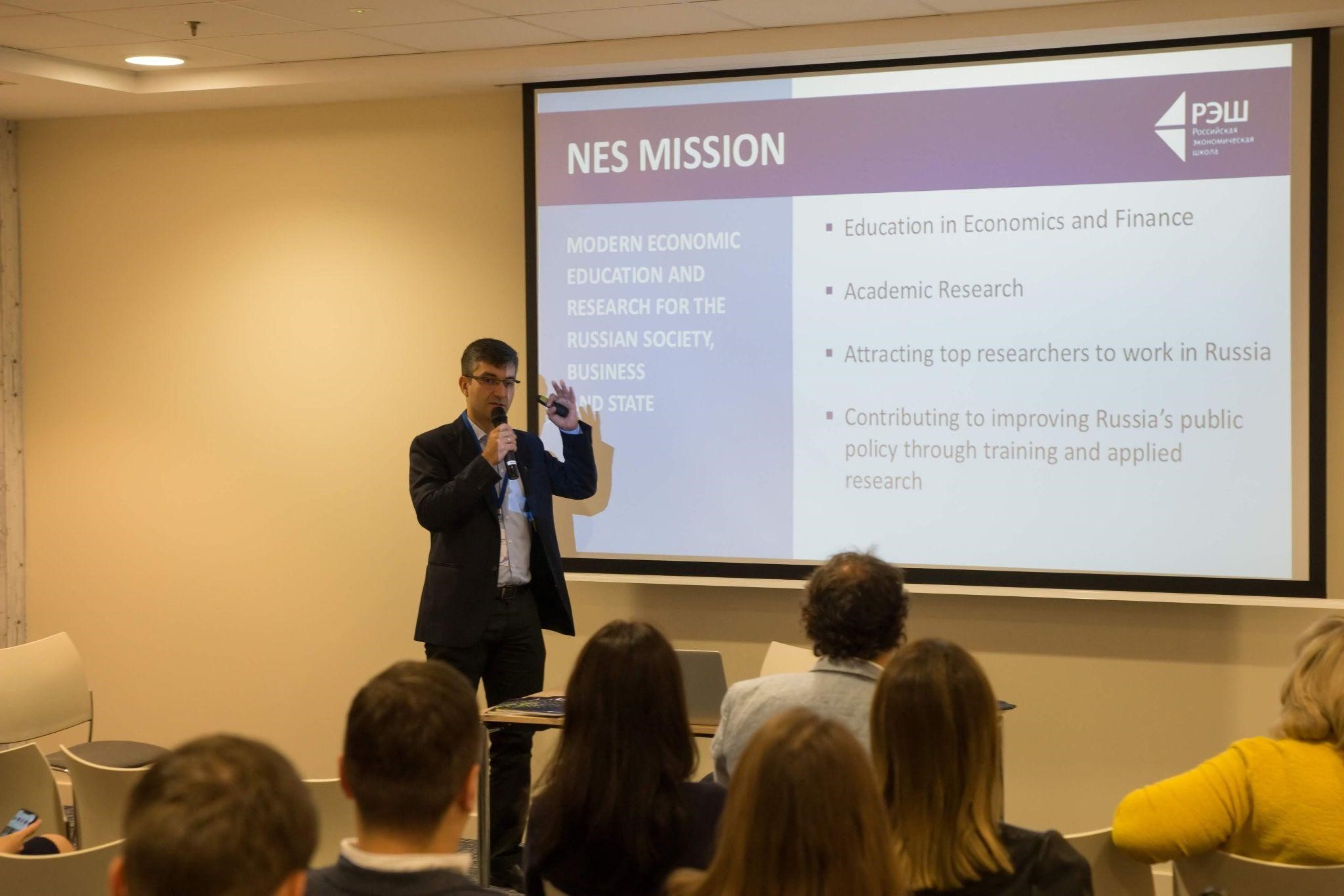
NES Alumni Meeting in London, 2019
Message to Future and Current Students: "Invest in Yourself"
To continue the topic, let's talk more about people and their goals. What advice or maybe a special message would you give to NES applicants and students, young people in general, who find it more difficult than usual to find their place and path in life. How can they understand what will happen tomorrow, and what can they do now to be successful in future?
The most useful, in my opinion, is investing in a somewhat more fundamental education rather than in a narrowly applied one. It expands the set of the possible career paths. When there is a lot of uncertainty in the world (and today this relates not only to Russia, but to the world in general), flexibility becomes very valuable. The deeper the education, the wider the opportunities and the faster and better you can adapt to the changing conditions. In this regard, investment in a very high-quality education is an investment that does not lose its relevance, in fact, it becomes ever more important in the current situation.
One more important thing: everyone talks about Data Science these days. It is a very important data analysis tool that allows solving serious problems, and now this tool has become absolutely essential for normal economists and financiers. Without the knowledge of Data Science, you actually have nothing to do in economics, so our data analysis courses are integrated in all NES training programs. Today, it is like knowing English. You need to know English and data analysis, otherwise you will not be a professional in your field. We have it just by default: all NES graduates know the fundamental things related to data analysis.
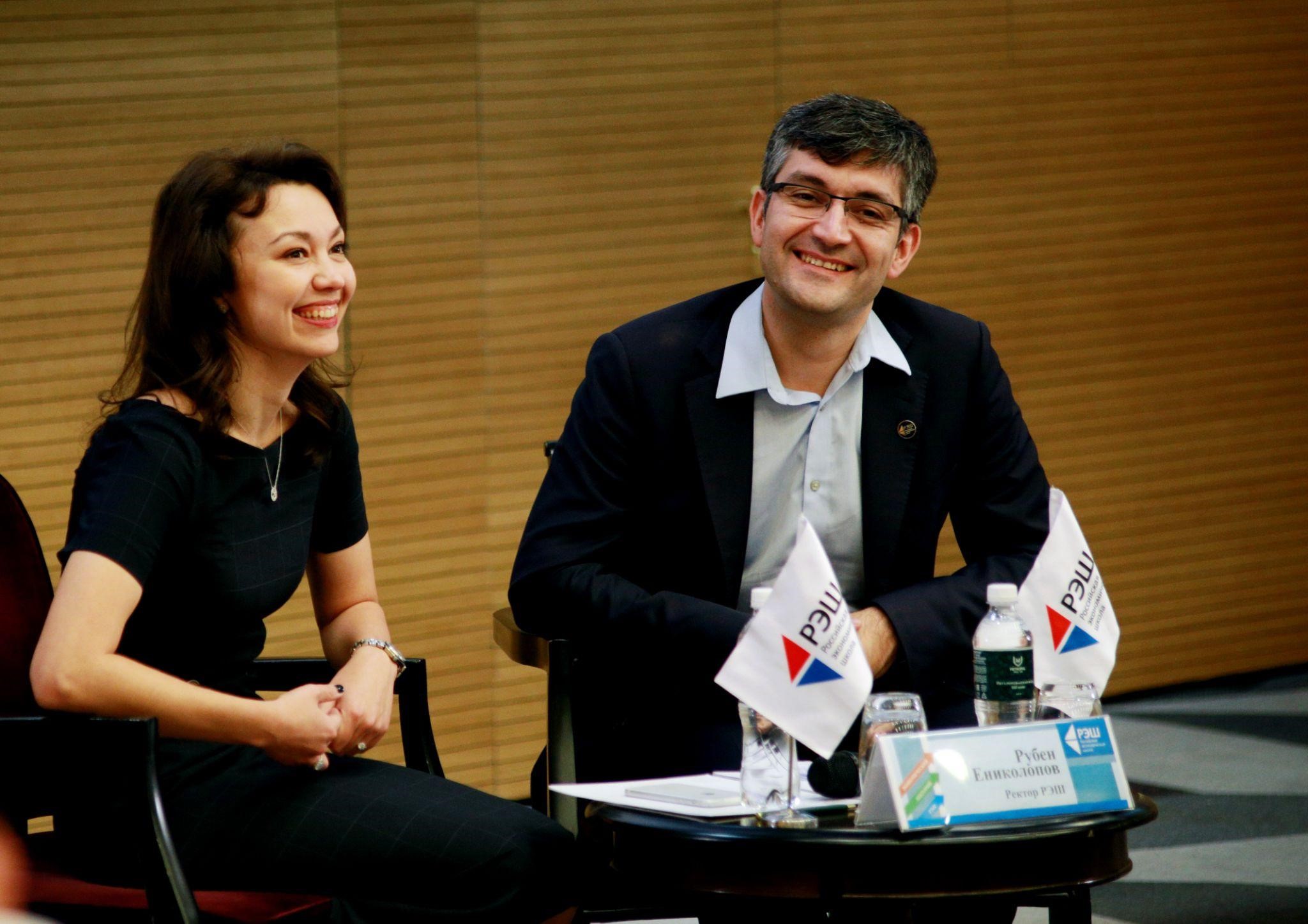
NES Graduate and Mercaux Founder Olga Kotsur with lecture at NES, 2019
And if we still try to talk about more applied matters. Let's say there is a young person who does not understand what to do next with his or her education. Before, they wanted to go into consulting, but now there are fewer opportunities in this field. Master's degree takes two years, so how can a student avoid mistakes and choose something more universal, if we may say so.
They should of course go to NES. We will soon publish on GURU an article with a map of professions and positions where NES graduates go to work. If you look at the range of positions, it is very wide: from tech companies to banks, there are even charity and education organizations. Our graduates can go for any industry, the range of possibilities is very wide, and this is a unique feature of NES. I want to emphasize once again: the main competitive advantage of the New Economic School is the wide choice of professional areas open for our graduates. There is no such thing as students’ immediate specialization and focus on a certain industry, including consulting. You can start in one field, and then, if necessary, quickly realign and change the areas in which to work, because the knowledge gained at NES allows you to do so. And this is very valuable.
What are your plans for the future? When you first announced your resignation from the position of the NES rector, you mentioned personal factors. Maybe there was something else?
This is a personal story. I am reuniting with my family; I want to live with them in Barcelona. Besides, as I said, if I continued working at NES, I would lose my permanent position in Barcelona, and I am not ready for that. I like that position, and Barcelona is a nice city. I did really have limitations on the part of the university in Barcelona, plus there were family reasons. These are the main factors. Also, I am starting to realize that I am starting to drop back as a researcher. I want to devote much more time to science. Any administrative work devours a huge amount of time that I could spend on research. And this was also one of the arguments in favor of resigning from my administrative position. I miss academic research.
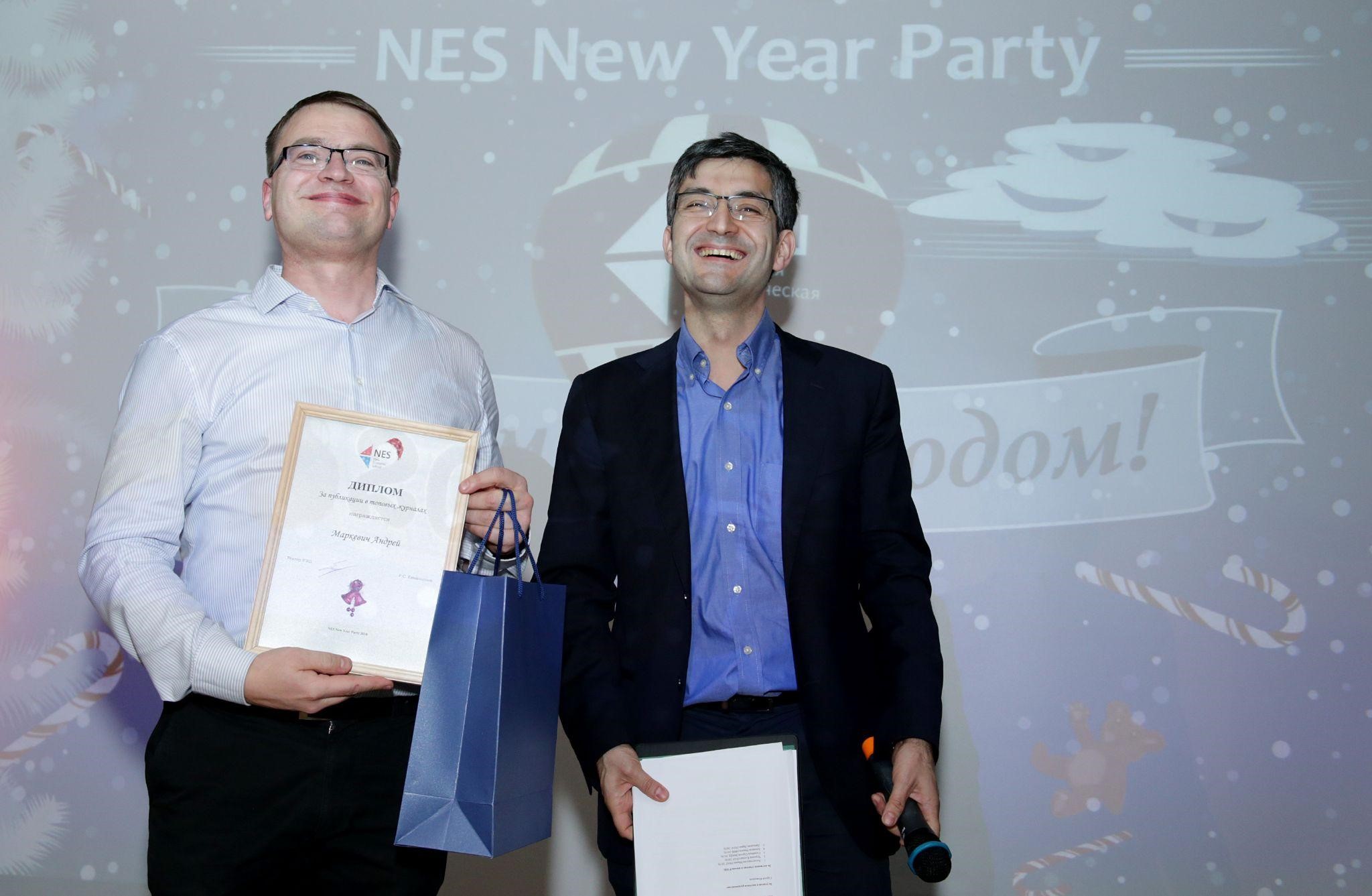
New Year Celebration, 2018
New Research and Rotation of Professors
In what field will your future research be? What do you want to focus on? Will you write about what you are observing in Russia now? There seems to be a lot of material.
My major field of research is the economics of mass media and the influence of social media. They are now playing a great role, and Russia in this sense is a very illustrative and vivid real-life case. This motivates me to do research, but I don't know yet whether it will be related to Russia or not. The reason is that it is difficult to get data on Russia, although there are some materials. When my wife and I started working on the media about 15 years ago, it was such a marginal field, someone said: “Who is there researching the media at all, who could be interested in it?” And now there is no need to explain why the media is important. Everyone finally realized that these are questions of the first order. It would sound not very modest, but we were a little ahead of time: we were among the first who began to seriously deal with these issues, when it was still far from mainstream. Today, everyone recognizes that these are fundamental things, so we feel quite well in the international academic community. Therefore, I don't need to change the field of my research.
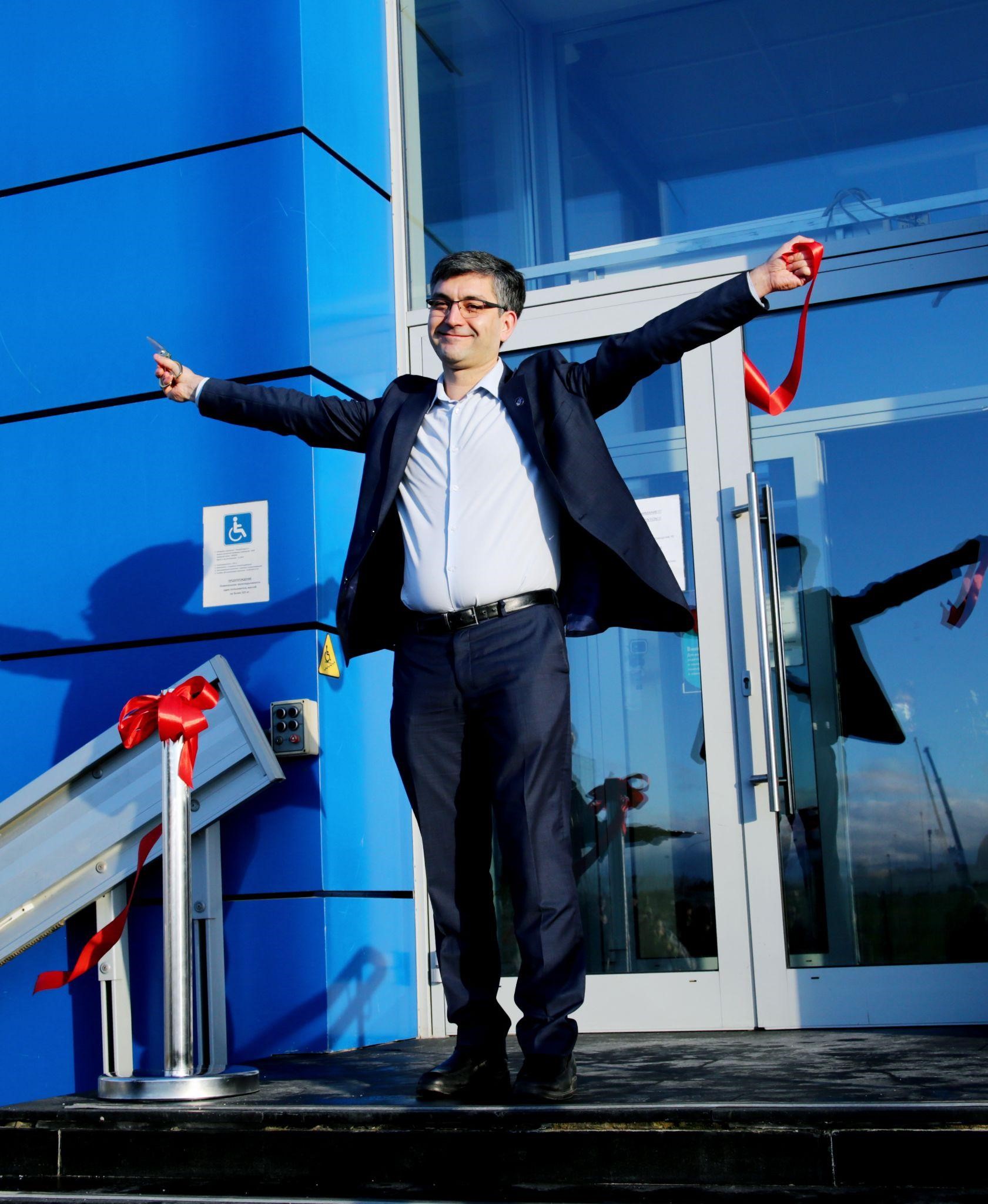
New Campus Opening Ceremony, 2021
We are rather trying to find out the next subject, what exactly you will write about. You haven't published anything on Telegram yet, for example.
It is impossible to collect data on Telegram. There is no data at all. As researchers, we are limited, we understand what exactly needs to be studied, but we cannot do everything we want: lack of data imposes very significant limitations. And, of course, we would be grateful if someone would provide us with the data on Telegram.
Still, there are some other, direct or indirect, ways of working with the social media. Basic, fundamental things can be easily shared from country to country. There are context peculiarities in specific countries. We have a lot of research on Russia, but at the same time we do not consider ourselves experts on our country. Russia is an example of general laws. When I talk to international colleagues, no one ever says: “You have studied this in Russia, so it is applicable only in Russia.” There are absolutely general issues that apply to other countries too. All in all, I have research not only on Russia, we are now working on the US, we have research on Nazi Germany, the countries of the former Yugoslavia. It can be easily extrapolated to different states. It is not the country in subject that matters to me; the questions I am trying to answer in my research are more important. And to be specific, the influence that the media has, the issues of propaganda, when and how it works – this is what I am going to concentrate my research activities on.
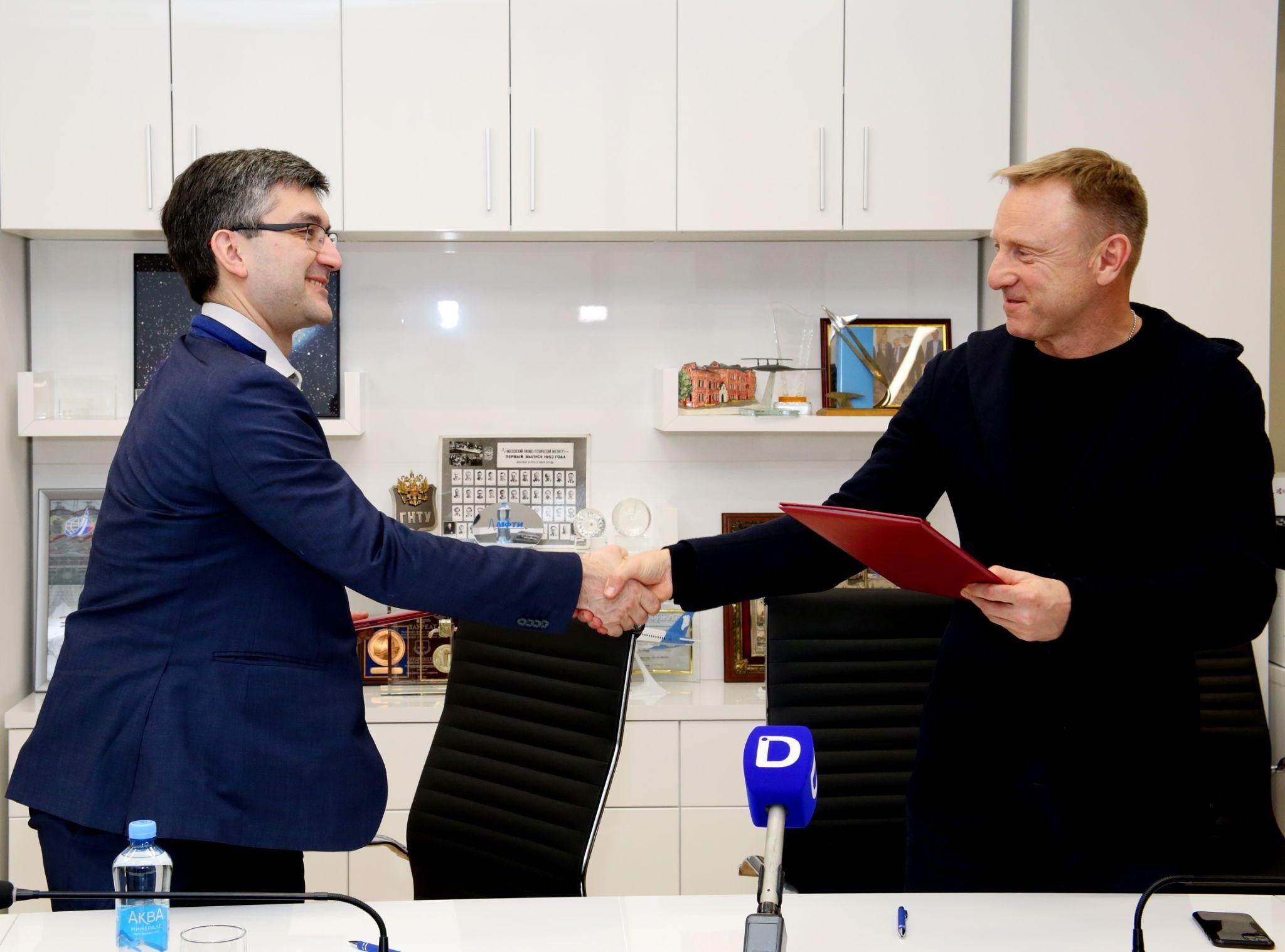
Signing of an agreement on educational cooperation with MIPT, 2021
What is the situation with professors at NES now? It is clear that all the recent events happened after the closing of the job market (usually in January). Is there a drain? What is your outlook? Are there any new professors joining?
We have certain losses. Two professors are leaving: they are Konstantin Egorov and Andrey Savochkin. They switch to other positions. Andrei Markevich takes a sabbatical, a one-year leave that a professor gets every seven years. Starting this September, Irina Denisova will replace him for this year as the co-director of the NES and HSE joint bachelor's degree program. At the same time, Andrei Markevich will remain on the program’s Board. A new professor, Davide Cianciaruso, is joining NES. He received his master's degree in Economics and Finance from Pompeu Fabra University in Barcelona, where I am returning, and then from Northwestern University. At the Kellogg School of Management, Davide received his PhD degree. His research interests include information economics, information disclosure, Bayesian methods, asset pricing, income management.
How do you assess your rectorship in general? Was it a rather positive experience, or do you still have heavy feelings?
One does not interfere with the other. All four years of my rectorship were an ongoing crisis management project. Honestly, I didn't really sign up for this. I didn't expect either a pandemic or what happened in February. Now I can teach crisis management. From the point of view of experience, it is not just about crisis management. I would say that I have a more philosophical approach to life now. In very many cases, I can now say “no big deal, we have gone through something worse.” Therefore, from the point of view of personal development, it was a very interesting and useful experience, not an easy one.
I think I have paid all my dues to NES. I owe a lot to the School, so for me it was a matter of principle to return what I owe. I returned it in the way in which I could and I think that we are even now. I still have very warm feelings and respect for NES and the entire community. And I will do what I can for the School.
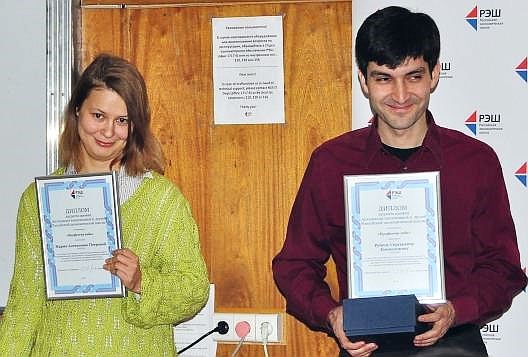
NES Alumni Reunion, 2010. Maria Petrova and Ruben Enikolopov with awards “Professors of the Year”

